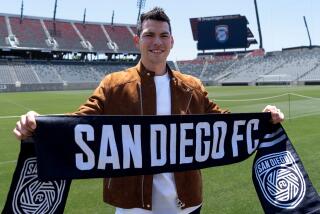Change in Sports Arena Leaseholder Seen : Purchase of San Diego Entertainment Inc. Expected in 2 Weeks
- Share via
The sale of the company that holds the lease to the San Diego Sports Arena could come “within two weeks,” a source close to the firm said Tuesday.
Bruce Blakley of Coopers & Lybrand, the accounting firm handling the sale of San Diego Entertainment Inc., said discussions are “under way with a number of interested parties,” several of whom are based in San Diego.
He confirmed that San Diego Sockers owner Ron Fowler is one such candidate but refused to say whether Fowler’s chances were better than anyone else’s.
Graymont Limited, a Canadian firm based in Vancouver, currently owns 80% of San Diego Entertainment, which makes it the holder of a Sports Arena lease that doesn’t expire until 2015. Thus, whoever acquires controlling interest in San Diego Entertainment acquires the lease to the building.
Arena Built in 1966
The Sports Arena was built in 1966 as a home for professional basketball and hockey, neither of which occurs there on a regular basis and won’t for the foreseeable future. The City of San Diego owns the acreage in Loma Portal on which the 13,139-seat arena was built with low-interest construction bonds.
In 1971, the city awarded the rights to the lease to Peter Graham, who holds majority interest in Graymont Limited. Graham, who lives in Vancouver, operated the arena until 3 1/2 years ago, when he was succeeded by local businessman Vin Ciruzzi.
Ciruzzi, current president of San Diego Entertainment, has been praised by city officials and sports executives after years of criticism heaped at Graham. Ciruzzi oversees a building that has as its regular tenants the Sockers, the San Diego State University men’s basketball team and a swap meet that occurs on weekends.
Under Ciruzzi, the building has been renovated; new seats installed and a fresh coat of paint applied. A new acoustical system, costing hundreds of thousands of dollars and put in for the enhancement of rock concerts--the arena’s main use these days--is another of Ciruzzi’s achievements.
But Ciruzzi hasn’t attained what he had hoped for when he took the job--a basketball or hockey franchise.
Bad Timing for San Diego
The Clippers of the National Basketball Assn. moved from San Diego to the Los Angeles Sports Arena just before Ciruzzi stepped in. He said the timing of their departure greatly weakened San Diego’s chances for an NBA expansion franchise. Ciruzzi candidly admitted that such chances aren’t promising even today. The NBA recently awarded expansion franchises to Miami, Charlotte, N.C., and Minneapolis.
In trying to woo an existing franchise to move to San Diego, Ciruzzi said that he and his top lieutenant, Phil Quinn, have traversed the country--but so far, to no avail.
“I do believe we’ve convinced NBA officials around the country that it wasn’t the city’s fault, wasn’t the arena’s fault, nor was it the fault of the fans, that the Clippers up and moved to Los Angeles,” Ciruzzi said. “I don’t think we can be blamed for the Clippers’ sins. Even so, that may not mean a franchise in the foreseeable future. We’re doing everything we can to bring it about, but these things take time--and luck.”
Ciruzzi said the city may have a better chance of landing a National Hockey League franchise. He said San Diego has a good reputation in hockey circles because of “strong, solid” attendance during the winters that minor-league hockey was played here. He said San Diego is being talked about as a target city for NHL expansion.
Sold-Out Games
Quinn, the arena’s general manager, pointed out that recent NHL exhibition games were either sold out or drew near-capacity crowds. The Los Angeles Kings, who recently signed hockey superstar Wayne Gretzky, played in one of those games, and aided by Gretzky’s appearance, that game sold out. Ciruzzi said Kings management would “like to see a franchise in San Diego” and had been “most helpful” in boosting the city’s chances.
Quinn disputed the notion that San Diego is not a good basketball town, pointing out that SDSU was host to a sold-out game with the University of North Carolina just last week. He noted that even the Clippers, who had one winning season in San Diego, consistently drew sellout crowds for the Boston Celtics, Philadelphia 76ers and Los Angeles Lakers.
Quinn said that his and Ciruzzi’s efforts had been aimed toward developing San Diego’s image as a city worthy of professional basketball. Ciruzzi said some of the newer expansion franchises had solicited as many as 10,000 season tickets “up front, before the franchise was granted” as an inducement to the NBA. Such efforts were successful in Sacramento, where the Kansas City franchise relocated, and in the newer expansion markets.
“But no one in San Diego has come forward with that kind of commitment,” Ciruzzi said. “Until they do, our chances for an expansion team aren’t so good. As for an existing team moving here, we’ll have to wait and see.”
But even if that’s in the offing, Ciruzzi and Quinn might not be around to see it. Although both are minority partners in San Diego Entertainment, it’s no guarantee that either will remain after controlling shares in the company are sold and a new leaseholder has taken over.
Even if they do remain, their role is limited in another way.
“We’d love to have hockey or basketball,” Ciruzzi said. “It’s the reason the arena was built. It would be terrific. But we don’t have the money or buy or operate a team. We have to depend on someone else, and at the moment, we just don’t know who the someone else will be.”
More to Read
Go beyond the scoreboard
Get the latest on L.A.'s teams in the daily Sports Report newsletter.
You may occasionally receive promotional content from the Los Angeles Times.










